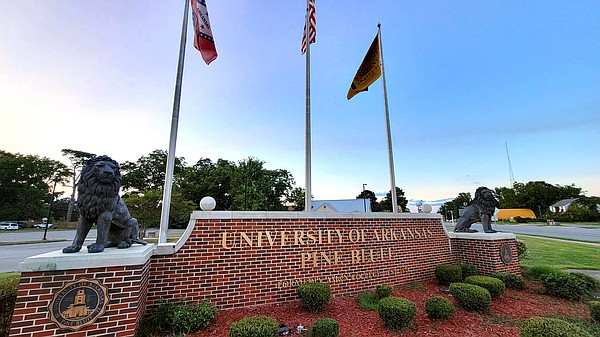Courtesy of University of Arkansas at Pine Bluff
With a $5 million grant from the National Science Foundation (NSF), the University of Arkansas Pine Bluff (UAPB) will lead a collaboration with the University of Arkansas, Fayetteville (UAF) and the University of Arkansas at Little Rock (UALR) to establish a Quantum Information Science and Engineering (QISE) program.
UAPB is one of three historically Black colleges, and universities (HBCUs) awarded the 2022 NSF Expanding Capacity in Quantum Information Science and Engineering program (ExpandQISE) grant, along with Howard University and Morehouse College. According to the Expand QISE Program, the award grants up to $5 million over five years to advance Quantum information into a new generation of computers, detectors, and new materials of the future.
The NSF-funded program, called QuAPB, will be located on the UAPB campus and will be a first-of-its-kind quantum center in this region of the United States. Once QuAPB is fully operational at UAPB, it will be an integrated research and education program in quantum materials and devices for integrated quantum photonics. UAPB Chancellor Laurence Alexander said, “This is a major grant from NSF and a great opportunity for us to work with our university system partners to expand our STEM program offerings. QISE is an area that will enable our students to obtain the advanced study and experience needed for the jobs of the future.”
According to Dr. Mansour Mortazavi, UAPB Vice Chancellor for Research, Innovation and Economic Development and Professor of Quantum Optics, “Establishing this world-class research and education at UAPB combines the talents and capabilities of scientists and engineers in Arkansas. It demonstrates that the discovery of new frontiers and discovery does not just happen somewhere or by somebody else. Instead, it can happen right here in Arkansas. QuAPB will also add a tremendous, highly influential workforce to Arkansas in a very prestigious field of science and engineering.”
The QuAPB team will include Dr. Qinglong Jiang, UAPB Assistant Professor in the Department of Chemistry and Physics, Dr. Daoyuan Wang, UAPB Assistant Professor in the Department of Chemistry and Physics, and Dr. Grant Wangila, UAPB Professor in the Department of Chemistry and Physics and Interim Dean of the School of Arts and Sciences, and Dr. Shui-Qing (Fisher) Yu, Professor of Electrical Engineering, representing UAF, along with Dr. Hugh Churchill, Associate Professor of Physics and Associate Director of the MonArk NSF Quantum Foundry, Dr. Gregory Guisbiers UALR Assistant Professor of Physics and Dr.Tansel Karabacak, UALR Professor and Chair, Department of Physics and Astronomy.
QuAPB would help support the establishment of the first graduate program in the physical sciences at UAPB. As the lead institution on the grant, UAPB will receive $3.5 million. The funding will enable UAPB to provide quantum laboratory and course content for bachelor’s and master’s degree students. This grant also supports QISE faculty at UAPB, reorients several nanomaterials experts at UALR and UAPB toward quantum applications, and creates a hands-on quantum laboratory course for BS/MS students. In addition, education and outreach activities will fuel the QISE student pipelines and promote engagement with K-12 schools about quantum careers.
Dr. Zeeshan Habeeb, Assistant Professor in the Department of Chemistry and Physics, is very excited to lead this effort, “This year’s Nobel Prize in Physics was awarded for quantum entanglement, a key theoretical concept that is the basis of quantum technology. As the field matures, there will be a high demand for qualified graduates, and UAPB will be there to meet it. We are working to create a degree program that will provide students with a solid foundation in scientific concepts and experiential opportunities through industry and research internships. As a result, our graduates will be competitive with the critical thinking skills to enter this emerging field and become the leaders to address the challenges of tomorrow.”
UALR and UAF will receive $750,000 each. Dr. Churchill and Dr. Yu will fabricate integrated quantum photonic devices at UAF. They will gather component materials from collaborators throughout QuAPB and leverage the heterogeneous integration capabilities of the MonArk NSF Quantum Foundry to produce complete devices for characterization at UAPB. Researchers at UA Fayetteville will also transfer quantum device characterization expertise to UAPB and provide opportunities for student training in UA Fayetteville labs and facilities. According to Dr. Churchill, “I am excited to be a part of this statewide effort to fabricate unique quantum devices in Fayetteville using materials from Little Rock that will be characterized in Pine Bluff, all in the service of educating students and developing advanced technologies. Success in our research and education efforts will give QuAPB the opportunity to anchor a piece of the rapidly growing quantum economy in Arkansas.”
Dr. Gregory Guisbiers, UALR Physics Professor, will lead the efforts on the UALR campus to synthesize quantum dots that will be used for the development of photonic devices. He will be helped by Dr.Tansel Karabacak, UALR Professor and Chair, Department of Physics and Astronomy, to develop quantum materials research in Central Arkansas. The UALR team will use two novel techniques named Pulsed Laser Ablation in Liquids (PLAL) and Hot Water Treatment (HWT) to design free and attached quantum dots, respectively.

